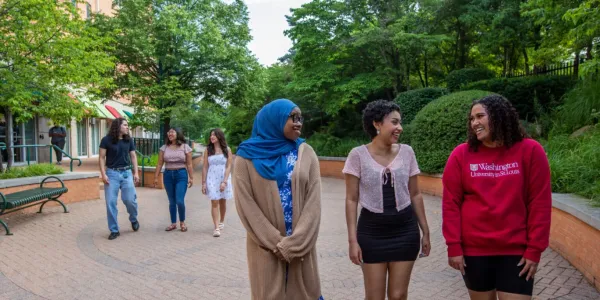On Sept. 13, Jennifer Smith, dean of the College of Arts & Sciences, announced the winners of the annual Dean James E. McLeod Freshman Writing Prize at a reception in the McMillan Café. Adon Wade-Currie and Olivia Crow shared first prize, and Emily Wyland received an honorable mention. Their winning essays are available to read by clicking the links below.
Adon Wade-Currie: “The Receptivity of Black Audiences to Progressive Black-Television”
The judges found his writing to be clear and articulate, and they were particularly impressed with the creative way in which he addressed double consciousness in the essay.
Olivia Crow: “Paging Equality: A Study of Women Leadership Positions in Medicine”
The judges found Crow's arguments particularly compelling, and her use of sources was excellent. They also noted the relevance of the topic.
Emily Wyland: “You Better Work: The Decriminalization of Sex Work as a Transgender Women of Color Rights Issue”
The judges found Wyland's topic to be important and timely. They commended her for taking on a project of this scope and complexity at this early stage in her college career.
Each year, the prize is awarded to first-year students who author original research papers that explore some aspect of race, gender, and/or identity. Sowande’ Mustakeem, an assistant professor of history and African and African-American studies, was inspired to start the prize by her first class of incoming freshmen in 2010. In her courses, students were required to delve into history, to “meet [black women] in history” through primary sources.
After reading many wonderful papers which uncovered new or little-known stories about a group traditionally overlooked by researchers, Mustakeem started to nominate some for prizes on campus. “However, they were continually removed from selection or overlooked largely because they were freshmen,” she says. “So I talked about it with other colleagues, and I decided to create a venue to celebrate their accomplishments as scholars-in-the-making, truly worthy of recognizing their intellectual production at an early age.”
Colleagues loved the idea. Mary Laurita, an assistant dean in the College of Arts & Sciences who now oversees the program, says “[Sowande’] was given crucial support by Gerald Early, who was then director of the Center for the Humanities, and Clara McLeod, who gave her permission to name the prize after James McLeod.” Dean McLeod seemed like a natural person to name the award after to everyone involved, Laurita says, because he “was a great supporter of intellectual engagement and the transformation that can occur when students immerse themselves in the study of subjects they passionately care about. He also understood the power of individual mentorship and teaching."
The prize announced its inaugural recipients in 2013. Mustakeem says, “I am truly elated to see the prize now a reality. The topics, the expansive ideas, the depth, and the rigor we are seeing at a very early stage in the collegiate career are truly remarkable for any intellectual community. Moreover, we hold space to carry forward Dean James E. McLeod's legacy through empowering students towards their greatest.”
Looking forward, Mustakeem says the McLeod Freshman Writing Prize hints at larger gaps in the Academy—hopefully ones that WashU is now training their students to bridge. “As students trace and tease out these stories through their work, the prize has revealed a need for engagement across multiple disciplines within and outside of the humanities, to engage the human experience in all its greatness, challenges, and lessons-learned,” she says. “This invariably allows us to understand race, gender, sexuality, class, and, most of all, each other in an intellectually compassionate way.”
This fall’s winners were chosen among a number of strong applicants by a selection committee comprised of faculty and staff across Arts & Sciences and the university, including Ingrid Anderson, Warren Davis, Trevor Dawes, Kathleen Finneran, Helen Human, Mary Laurita, and Jordan Victorian. Papers can be submitted by the students themselves or nominated by a professor. The award is given annually at the start of the students' sophomore year, but papers can be nominated two times a year, once in the fall and once in the spring. To read more about the prize guidelines, or to nominate a paper, visit the College website.




